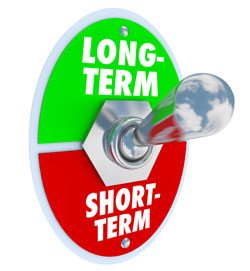What we do today has a long-term effect for both the customer and our company. Learn more in this article by Errol Allen.
 When I receive or am told of sub par customer service, I often wonder if the service provider is thinking about the long-term impact of this type of performance.
When I receive or am told of sub par customer service, I often wonder if the service provider is thinking about the long-term impact of this type of performance.
Providing a service or product to your customers requires one to always think long-term. Customer service decisions made today impact your company’s future. Thinking long-term first of all should mean that the customer is at the forefront of your business strategy.
Interactions with your customer should be done in a manner that promotes repeat business. Customer service personnel must be trained to think long-term and provided with options that allow them to resolve customer issues from a long-term perspective.
A good friend here in Houston called me while he waited for service at a big box retailer. During our conversation, he paused to ask a store employee “So you’re going to bring another person in front of me? You have yet to ask me what I need!”
What the store employee didn’t know was that my friend planned to purchase a laptop for his daughter. Well, he didn’t after this encounter! An acknowledgement of my friend’s presence along with an explanation of the employee’s actions may have led to the purchase of the laptop. Just a moment to consider the long-term impact of ignoring a customer may have led to my friend becoming a long-term customer.
Thinking long-term requires one to consider how to handle a customer complaint. The old adage of “the customer is always right” is not necessarily true in all situations. The customer may have misunderstood, misinterpreted, misread, or just plain wants to have his/her way.
What’s important for the long-term is the handling of the situation. Your demeanor, voice tone, body language during phone or face to face interactions and verbage utilized when interacting via chat or email play a huge role in retaining this customer.
Think long-term when formulating solutions to the issue. Preserve the customer’s dignity when you know that they are just plain wrong. Don’t allow your ego to enter into this interaction. Go into your INP mode. INP means It’s Not Personal. Take a deep breath and think long-term! Weigh the cost of resolving the situation in the customer’s favor against the possibility of losing long-term revenue.
Think long-term when considering changing your service concept of product. How will your customer be impacted by your decision? Is the change the result of customer input? If not, have you considered getting your customer’s feedback on your proposed change?
I think we all remember what happened when a famous soft drink company changed the formula for its popular product. Although focus group results appeared positive before launching the change, customers in the southern U.S. held the original formula dear to their hearts.
The backlash from this region was tremendous. Who holds your product or service dear to their hearts? Long term thinking will help you to ask the right questions of the right people when you’re considering making changes to your service concept or product.
The trash service provider for my subdivision sent out a letter stating that they were changing the truck type from one that requires a crew of three to one that only requires a one person crew. Now I think that’s great for the expense categories of their budget, but how will this change impact the customer?
The new truck’s retractable lift arms called for the customers to utilize a new garbage can – one that is specially made for the lift arms. I called the company and asked is the customer responsible for obtaining the proper garbage can or will one be provided by the company. That was six months ago – I’m still waiting for an answer.
If the answer comes back that requires customers to purchase the new garbage can, the company will more than likely lose the contract. My subdivision is small with only 87 homes, but that contract represents about $17500.00 of annual revenue. Long term thinking is required by the company in making the decision as to who is responsible for purchasing the new garbage cans.
The willingness to think long-term when servicing customers is one of the most important business strategies that you can incorporate into your day-to-day operations. Make sure everyone within the organization is thinking long-term in regard to customer service.
Thinking long-term requires one to always ask – “If I proceed in this manner, what is the long-term effect for both the customer and the company?”
About the Author
Errol Allen has over 25 years of experience in the customer service industry including 13 years in a management role. Having held positions as an Internal Customer Service Consultant, Call Center Quality Manager and Operations Analyst, Errol understands the need for a “systems” orientation to providing excellent customer service.




